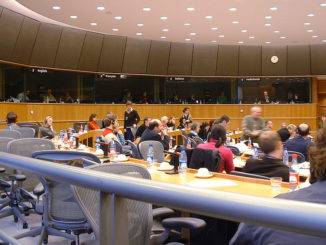
By Hans van Scharen
There are “strong links between politics and the biggest beneficiaries of the subsidies” in five Central and East European member states of the EU. That’s according to a new in-depth study “Where does the money go”, which examines the implementation of the EU agriculture funds in Hungary, Slovakia, Bulgaria, Romania and the Czech Republic. The study, which was commissioned by the Greens/EFA political group in the European Parliament, sheds a stark light on how the CAP is not only funding degradation of biodiversity but also degrading democracy. Hans van Scharen reports.
‘Green collar crime’ in the EU
In the past, irregularities with EU-subsidies for agriculture had almost become a ritual part of the annual ‘European budget discharge’ or even ‘discharge-folklore’. Imaginary sheep in Greece, larger than life olive-trees in Italy and waste meat from Belgium exported and sold as premium meat, just to name a few of the classics.
With a number of fraud scandals concerning EU-subsidies around the start of this century, the EU institutions stepped up their game to improve controls and auditing. So the past years the Court of Auditors would write in its annual report that “the error margins on expenditure continue to fall” and that there were almost no irregularities concerning direct payments to farmers. The European Parliament would then usually state that the member states should do better in controlling what happens with the payments of subsidies and then grant discharge.
But it became clearer that this so called folklore or ‘green collar crime’ was not that folkloric after all, but on the contrary often linked to hardcore organised crime, oligarchs, land grabbing, fraud and corruption. Since a few years, authoritarian regimes in Central and Eastern European countries showed a particular appetite for the stream of CAP-subsidies.
Early November 2019, for example, the New York Times dropped ‘a little bomb’ on the EU bubble and those dealing with the CAP by publishing extensive research under the title ‘The Money Farmers: How Oligarchs and Populists Milk the E.U. for Millions’.
The NYT investigative articles lead by saying that chunks of the billions the EU spends to subsidise agriculture “emboldens strongmen, enriches politicians and finances corrupt dealing”: “Every year, the 28-country bloc pays out $65 billion in farm subsidies intended to support farmers around the Continent and keep rural communities alive. But across Hungary and much of Central and Eastern Europe, the bulk goes to a connected and powerful few. The prime minister of the Czech Republic collected tens of millions of dollars in subsidies just last year. Subsidies have underwritten Mafia-style land grabs in Slovakia and Bulgaria.”
A warning signal for the trilogues
In the midst of ongoing trilogue negotiations on the CAP-reform – giving more power over agricultural policies to member states – and ongoing political arm-wrestling between the European Commission and countries like Hungary, Poland and Czech Republic, it seems that the Greens/EFA group in the European Parliament wanted to make sure these kind of journalistic and civil society investigations were not forgotten.
Read and Download the Report Where Does the Money Go?
The political group recently published an in-depth and rich study (see link above) on the implementation of the EU agriculture funds in five Central and Eastern European countries – Bulgaria, the Czech Republic, Hungary, Slovakia and Romania: “In recent years, we have seen mounting evidence that the European Union’s funds in Central and Eastern Europe (CEE), particularly EU agriculture subsidies, tend to end up in the hands of local oligarchs connected to the political elites or big (agro) conglomerates rather than helping the small- and medium-sized farmers. The cases, which include conflicts of interest, nepotism or outright corruption and fraud, have made international headlines.”
The researchers found evidence of ongoing and systematic abuse of CAP-subsidies – calling it “highly problematic” – which could potentially hinder the EU in its efforts to achieve its goals on a number of levels: Firstly, because it creates “doubts about the EU’s ability to implement its budget effectively by avoiding risks related to corruption, fraud and misuse of EU money”. Secondly, it calls into question if the distribution of EU CAP-subsidies is serving the goals of the EU, “such as protecting biodiversity, fighting climate change and inequalities or whether it serves the interests of the economic and political elite”. And thirdly, the developments could “overshadow and undermine the EU’s fight for the rule of law in the EU while its funds may possibly help to finance illiberal leaders and populists directly or indirectly”.
So where does the EU money go?
The researchers show there is a “clear inequality between the fund allocations for the big farmers and the small and that there are systemic advantages for the big farms whose managers generally have close ties to the ruling parties in their countries”.
The report also states that the countries do not use the existing instruments provided by the CAP to support small scale farmers: “In addition, small farmers in the EU member states feel that they are faced with a lot of administrative red tape, which often prevents or demotivates them from applying for funds.” The evidence from the report also shows that in some cases big farms are being treated in a preferential manner.
The practice whereby oligarchs split up companies “in order to evade the EU agricultural payment caps remains a big issue” write the researchers. According to them “so far, there is no evidence that this instrument works in a way which it was designed for: it seems that it is even a common practice, for example in Bulgaria or Hungary, that big farmers divide their estates into several companies. A similar problem was also indicated by small farmers in the Czech Republic.”
Furthermore the researchers write that “conflict of interest as well as of revolving doors” remain a serious problem in the agri-sector. The report finds “strong links between politics and the biggest beneficiaries of the subsidies in all five member states” and that “without close linkages to politics in some cases equal access to land is almost impossible”.
“In some countries, the position of a mayor, a head of an agency or a department head in the ministry becomes ‘attractive’ especially because of the access to EU-funds and to direct payments for leased land in particular. Even worse, as shown in particular in the case of Slovakia, EU agricultural funds have become an attractive business opportunity for different type fraudsters with little interest in farming itself”.
All this can of course only thrive thanks to “a lack of transparency and public access to data regarding the allocation of the subsidies”, which prevents any serious public supervision procedure and undermines public trust. “This all further underlines the question as to how the member states can ensure an orderly distribution of the funds, which meets the EU criteria for competition, transparency and non-discrimination of the funds.”
Hungary bites back
The study triggered an angry reaction from the Hungarian government, which described the report as a ‘Tsunami of Lies’ in a statement.
In response to this refutation, Green MEP Viola von Cramon, told EURACTIV that in Hungary “the majority of the CAP funds are getting into the hands of a very few people, and none of these facts were disproved by the Hungarian Ministry. Instead of writing baseless propaganda letters and using statistics which do not prove anything, the Hungarian government should focus on making a CAP that works for Hungarian farmers, rather than just a few landowners, government politicians and their family members. The Hungarian ministry should make sure that all farmers get equal access to land, both in lease and also for ownership. Hungary, like all EU states should support more transparency in the disbursement of CAP funds and enforce the capping of agricultural funds.”
A source within the Green group said: “It indeed seems the study comes really timely and touches some open nerves. The problematic countries such as Hungary are really not happy about this being discussed in the context of the ongoing CAP negotiations.”
Social discontent
As the Greens’ study states, in many Central and Eastern European countries, such as Bulgaria, the Czech Republic or Hungary, “these scandals have triggered massive public protests in recent months and years. The public in those countries is very reliant on the EU institutions, particularly the European Commission, to ensure that such mismanagement of EU funds is prevented. However, it is a sad irony that, often, many of these cases still seem to be taking place ‘too far away’ from the attention of Brussels.”
And even when it does attract attention, in the case of, for example, the Czech Prime Minister Andrej Babiš and his agro-chemical conglomerate Agrofert, Brussels seems relatively powerless. The Parliament’s Budget Committee (CONT) conducted a tense fact-finding mission to the Czech Republic in February 2020. There, MEP Monika Hohlmeier stated that “there is currently no clear mechanism to prevent and address situations which may objectively be perceived as conflict of interests, as required by Article 61 of the Financial Regulation.”
This over-and-back game is still ongoing, as in recent weeks CONT, the Commission and the Czech authorities wrangle over the application of Article 61 of the Financial Regulation, payments (direct and indirect) to Agrofert.
And yet, after almost 3 years of research and firm administrative follow up by which the European Commission concluded that Babis is a direct and unrightful beneficiary of millions CAP-subsidies, which should be paid back, nothing meaningful has happened in concrete terms.
High stakes in the CAP reform
The question is how the CAP reform will influence or exacerbate the negative trends in member states as described in the new report. In this context it is useful to remember a critical report on the Commission’s proposals to reform the Common Agricultural Policy (CAP), which the EU’s Court of Auditors (ECA) published in November 2018. Because amidst political talk that there should not only be less CAP spending, the ECA states it should, above all, be used in a more targeted manner.
The list of reform-objectives of the new CAP is ambitious and long: income support for farmers, more competitiveness, a better distribution of power in the food supply chain, fighting climate change, a more sustainable food production, protecting biodiversity. The million euro question is if the new CAP will meet these ambitions? The ECA did not think it will: “The proposed reform of the Common Agricultural Policy after 2020 falls short of the EU’s ambitions for a greener and more robust performance-based approach, according to an Opinion published today by the European Court of Auditors. The auditors identify a number of other issues with the proposal, notably in terms of accountability.”
“The move towards a performance-based assessment would not remove the need to check legality and regularity”, said João Figueiredo, the Member of the European Court of Auditors responsible for the Opinion. “We fear that a legal provision stating that only a very small part of expenditure needs to be effected in accordance with Union rules could make these rules meaningless and might undermine the application of EU law”.
The report by the Greens concludes that “it seems absolutely key to put in place the system of controls regarding the final beneficiaries and beneficial owners”: “Also, the prevention that the funds are being corrupted by the conflict of interest as stipulated by the EU Financial Regulation is key. Last but not least, it is clear that substantive auditing and controls both on the national and European level are key conditions for the protection of the EU Agriculture funds. In this sense it is extremely worrying that the new CAP proposal could lead to further soften the role of the European level in the controlling system.”
The findings of the new study ‘Where does the EU money go’ seem to prove the ECA warnings from 2018 right. One can only hope the auditors based in Luxembourg are reading the Greens’ study and do a follow-up, because if in the coming weeks the CAP-trilogue negotiations reach a political agreement, the situation looks pretty grim. The EU will again be bankrolling the eroding of democracy under the name of a more sustainable agriculture. And at the same time, eroding biodiversity and wiping out further middle- and small scale farms.
The Rule of Law in the EU
There are however some silver linings too. Apart from citizens and civil society uproar in the countries concerned, there is also a more serious EU-approach towards the rule of law. In an essay titled “How the EU Can Better Avoid Bankrolling Authoritarianism” Ken Godfrey, executive director of the European Partnership for Democracy, points to the changing internal EU rules for allocating funds to avoid bankrolling authoritarianism and this because Europeans “have grown uneasy about democratic backsliding and creeping authoritarianism” in several member states. As a result, European leaders agreed in late 2020 to create a new mechanism linking allotments of union funds to EU member states with those countries’ respect for the rule of law—in other words, making the transfer of EU funds to member states conditional.”
Godfrey mentions that although this new mechanism has been agreed to, the European Parliament and the European Council have not yet passed the full budget: “While a political compromise means that the new mechanism is not as strong as it should be, the EU now has a new tool that should help prevent EU funds from supporting democratic erosion within the union,” writes Godfrey.

Hans van Scharen, born in Brussels, studied Journalism in The Netherlands and worked as a journalist for newspapers, magazines and television in both Belgium and the Netherlands for over 15 years. For a decade (2009-2019) he worked as parliamentary assistant to Belgian MEP Bart Staes in the European parliament, focussing on agricultural and food policy related issues like pesticides, food waste, seeds and trade. Since the start of 2020 he works as media officer for the Brussels based research and campaign NGO Corporate Europe Observatory (CEO) and works as freelance journalist.
More on CAP spending
Billions for CAP as an “extinction machine” – Farm to Fork Derailed
CAP | Time for Commission to Get Real on Spending, Say Auditors
Bad Czechs and Balances: Commission Audit Confirms Czech PM in Conflict of Interest
EU Subsidies Benefit Big Farms While Underfunding Greener and Poorer Plots – New Research






1 Trackback / Pingback
Comments are closed.